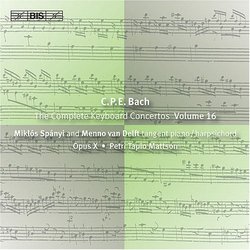| All Artists: Carl Philipp Emanuel Bach, OPUS X Ensemble, Miklós Spányi, Menno Van Delft Title: C.P.E. Bach: The Complete Keyboard Concertos, Vol. 16 Members Wishing: 0 Total Copies: 0 Label: Bis Original Release Date: 1/1/2008 Re-Release Date: 2/26/2008 Album Type: Import Genre: Classical Styles: Chamber Music, Forms & Genres, Concertos, Historical Periods, Classical (c.1770-1830), Instruments, Keyboard Number of Discs: 1 SwapaCD Credits: 1 UPCs: 675754005474, 7318590015872 |
Search - Carl Philipp Emanuel Bach, OPUS X Ensemble, Miklós Spányi :: C.P.E. Bach: The Complete Keyboard Concertos, Vol. 16
 | Carl Philipp Emanuel Bach, OPUS X Ensemble, Miklós Spányi C.P.E. Bach: The Complete Keyboard Concertos, Vol. 16 Genre: Classical
|
Larger Image |
CD Details |
CD ReviewsDon't be discouraged... CD Collector | Cleveland, OH, USA | 09/27/2009 (5 out of 5 stars) "by the philistine review below. Yes, Opus X sounds different from the orchestra Spanyi used in earlier recordings, but their playing is equally dynamic and well-balanced with the horns and flutes. The claim that BIS used Opus X because it uses fewer players to make more money is patently ridiculous. The reviewer below doesn't really know much about how the recording industry works in our day and age. European musicians are all union members, and their contracts typically include the right for management to record a certain amount of CD's at no extra pay for the the musicians, since they collect government-funded full-year salaries. They are usually paid much better than the average musician in the US, and their health care is free, so they're OK with such contract provisos. Second, even if the ensemble is not entirely government funded (which is the case in a few circumstances, and I don't know if this is the case with Opus X), there are ample opportunities to receive foundation grants for recording projects such as this, especially in Scandinavia. Why do American orchestras not record nearly as much as they did 20 years ago? Because NAXOS figured out how to use the above described model to its advantage, so they can produce a symphonic recording for no more than the cost of a conductor (potentially soloist) and the 1-2 person recording team (and they don't pay the conductors and soloists a heck of a lot, I know from personal experience). American orchestral musicians unions still want individual musicians paid for a recording, which is why the top 6 orchestras in the US only record for DG with Lang Lang and other currently hyped superstars if they record at all), because without them, the recording would never break even. Independent labels like BIS follow the NAXOS model, so the cost of the orchestra is essentially irrelevant to them. These recordings are delightful, and the best resource for some of CPE Bach's most beautiful and inventive music. I have bought all the recordings in the series so far, and will continue to do so. Looking forward to the next issues!" Another outstanding effort Mel Zaloudek | chicago | 07/12/2008 (5 out of 5 stars) "....master keyboardist Spanyi and his magnificently obscure tangent piano have been discovering the heart and soul of Emanuel Bach's concerti for quite a few years now, and his passion for the composer only grows with each new recording in this BIS series......I've looked forward to every new volume and am always well rewarded with stellar period instrument performances AND a thick authoratative booklet to boot!......kudos to the BIS label..........if you're new to this series or CPE Bach in general (personally, I like everything Emanuel) you should go back and get Vol.6, which happens to have three of the most astonishing world premier recordings you'll ever hear from this composer......and then you'll be picking up the rest, one by one, in this ongoing labor of love....." The solo instrument is not the real problem D. Sills | Savage, MD United States | 02/23/2009 (3 out of 5 stars) "Most of the reviews of the later volumes of this series focus on the solo instrument - lovers and haters of the tangent piano both. I actually don't find the choice of solo instrument to be nearly as difficult to stomach as the orchestral playing. Spanyi's move from the gorgeous sounds of Concerto armonico to the scrawny and under-personed (I suppose it can't be undermanned) Opus X is a really difficult pill to swallow, especially since his own playing is uniformly beautiful in this music. The justification is the "chamber" nature of the concertos and the fact that in Quantz, this 2/2/1/1/1 orchestra is a minimal orchestra - right, but that doesn't mean that Quantz recommended it where it wasn't necessary. I would have no difficulty with this is Spanyi were doing a third recording of these works - let him have whatever theories he wants, then. But given that these are likely to be the only recordings of these works, several of which are really marvelous, in my lifetime, foisting these theories on his public is a cruel trick. To be honest, my suspicion is that economics has more to do with it than the nature of the concertos or anything written by Quantz - fewer players means more profit for Bis. However, that is nothing more than suspicion. But taking an string group that small and adding flutes and horns is patently absurd: the winds themselves only make sense against a larger palette than the augmented string quintet can supply.
All that said, if you want to hear these works, this is the only way. And Spanyi started out so well.... Sigh...." |

 Track Listings (9) - Disc #1
Track Listings (9) - Disc #1